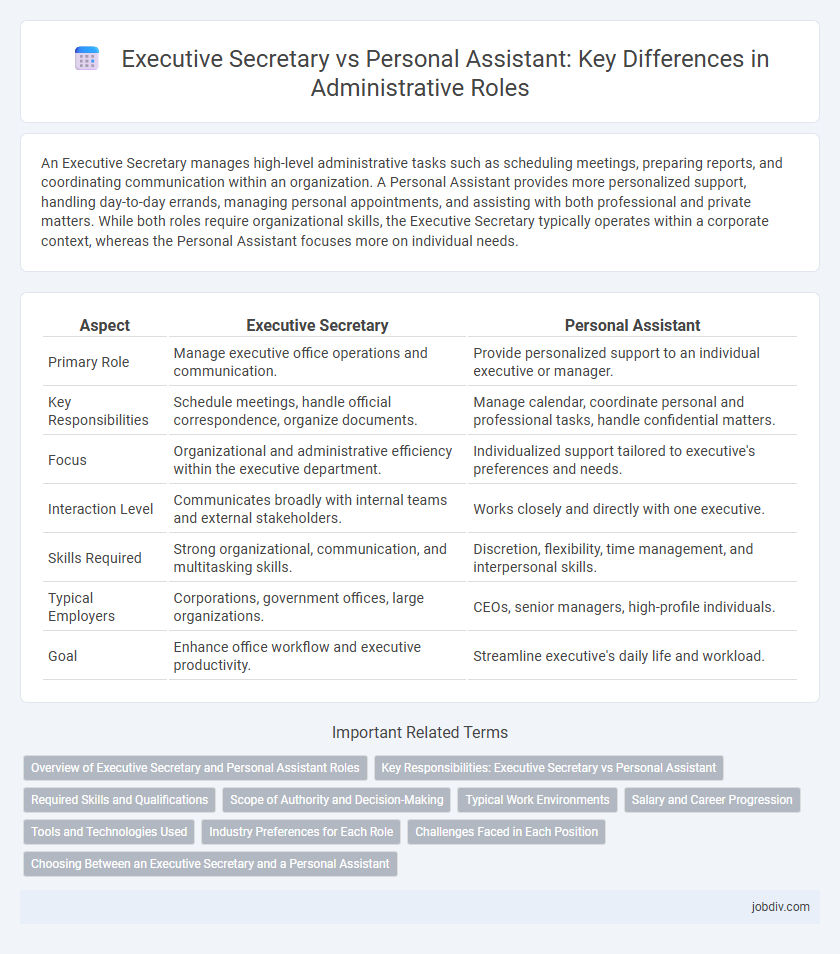An Executive Secretary manages high-level administrative tasks such as scheduling meetings, preparing reports, and coordinating communication within an organization. A Personal Assistant provides more personalized support, handling day-to-day errands, managing personal appointments, and assisting with both professional and private matters. While both roles require organizational skills, the Executive Secretary typically operates within a corporate context, whereas the Personal Assistant focuses more on individual needs.
Table of Comparison
| Aspect | Executive Secretary | Personal Assistant |
|---|---|---|
| Primary Role | Manage executive office operations and communication. | Provide personalized support to an individual executive or manager. |
| Key Responsibilities | Schedule meetings, handle official correspondence, organize documents. | Manage calendar, coordinate personal and professional tasks, handle confidential matters. |
| Focus | Organizational and administrative efficiency within the executive department. | Individualized support tailored to executive's preferences and needs. |
| Interaction Level | Communicates broadly with internal teams and external stakeholders. | Works closely and directly with one executive. |
| Skills Required | Strong organizational, communication, and multitasking skills. | Discretion, flexibility, time management, and interpersonal skills. |
| Typical Employers | Corporations, government offices, large organizations. | CEOs, senior managers, high-profile individuals. |
| Goal | Enhance office workflow and executive productivity. | Streamline executive's daily life and workload. |
Overview of Executive Secretary and Personal Assistant Roles
Executive Secretaries primarily manage complex administrative tasks, coordinate executive schedules, and facilitate communication between senior management and internal or external stakeholders. Personal Assistants provide individualized support to executives, focusing on managing personal and professional appointments, handling correspondence, and assisting with daily organizational needs. Both roles require strong organizational skills, confidentiality, and adaptability but differ in the scope and nature of their responsibilities.
Key Responsibilities: Executive Secretary vs Personal Assistant
Executive Secretaries manage high-level administrative tasks such as organizing executive schedules, preparing reports, and handling confidential communications, ensuring efficient office operations. Personal Assistants focus on providing personalized support to individuals, including managing appointments, coordinating travel, and assisting with personal errands. Both roles require strong organizational and communication skills, but Executive Secretaries primarily support executive management while Personal Assistants cater to individual-specific needs.
Required Skills and Qualifications
Executive Secretaries require advanced organizational skills, proficiency in handling confidential information, and expertise in managing executive calendars and communications. Personal Assistants need strong multitasking abilities, excellent interpersonal communication, and adaptability to support personal and professional tasks. Both roles demand high discretion, time management, and proficiency with office software, but Executive Secretaries often require a higher level of administrative experience and specialized training.
Scope of Authority and Decision-Making
Executive Secretaries typically hold broader scope of authority, managing complex administrative functions, coordinating high-level meetings, and handling confidential communications with decision-making responsibilities that impact organizational operations. Personal Assistants usually focus on supporting individual executives by managing schedules, arranging personal and professional appointments, and handling routine decisions within clearly defined parameters. The difference in decision-making lies in the executive secretary's capacity to act independently on behalf of senior management, whereas personal assistants primarily execute tasks under direct supervision.
Typical Work Environments
Executive Secretaries typically work in corporate offices, government agencies, and large organizations where they manage complex schedules, prepare reports, and coordinate between departments. Personal Assistants are often found in smaller companies, private homes, or for high-profile individuals, providing personalized support such as managing personal appointments and handling confidential matters. Both roles require strong organizational skills, but the Executive Secretary's environment emphasizes formal communication networks, while Personal Assistants operate in more flexible, tailored settings.
Salary and Career Progression
Executive Secretaries typically earn higher salaries, with averages ranging from $60,000 to $85,000 annually, reflecting their advanced responsibilities and organizational scope compared to Personal Assistants, who generally earn between $40,000 and $60,000. Career progression for Executive Secretaries often leads to senior administrative roles or office management positions, while Personal Assistants may transition into specialized roles such as project coordination or executive management support. Salary growth for Executive Secretaries is influenced by their experience in complex administrative tasks and leadership capabilities, whereas Personal Assistants advance by developing niche skills and expanding their professional networks.
Tools and Technologies Used
Executive Secretaries often utilize advanced scheduling software like Microsoft Outlook and document management systems such as SharePoint to handle complex calendars and corporate communications effectively. Personal Assistants frequently rely on mobile productivity apps like Google Workspace and task management tools like Trello or Asana for managing daily errands and personal schedules. Both roles increasingly incorporate communication platforms like Zoom and Slack to facilitate seamless remote collaboration and real-time updates.
Industry Preferences for Each Role
Executive Secretaries are commonly preferred in corporate environments such as finance, law, and government agencies where high-level administrative duties and confidentiality are critical. Personal Assistants tend to be favored in entertainment, media, and startup industries due to their flexible role encompassing both professional and personal task management. Industry preferences often depend on the scope of responsibilities, with Executive Secretaries handling complex organizational support and Personal Assistants providing personalized assistance to executives or entrepreneurs.
Challenges Faced in Each Position
Executive Secretaries often face challenges related to managing high-level communications and coordinating complex schedules for multiple executives, requiring exceptional organizational skills and discretion. Personal Assistants typically encounter difficulties balancing varied personal and professional tasks, adapting quickly to the principal's changing needs and maintaining confidentiality in sensitive matters. Both roles demand strong problem-solving abilities, but the Executive Secretary role leans more towards strategic administrative support, while the Personal Assistant role requires personalized attention and flexibility.
Choosing Between an Executive Secretary and a Personal Assistant
Choosing between an Executive Secretary and a Personal Assistant depends on the specific administrative needs and organizational structure. An Executive Secretary typically handles high-level office management, formal correspondence, and executive support, while a Personal Assistant focuses on managing the executive's personal schedule, travel arrangements, and private tasks. Evaluating the scope of responsibilities and the required skill set ensures the right role aligns with business efficiency and executive support demands.
Executive Secretary vs Personal Assistant Infographic

 jobdiv.com
jobdiv.com